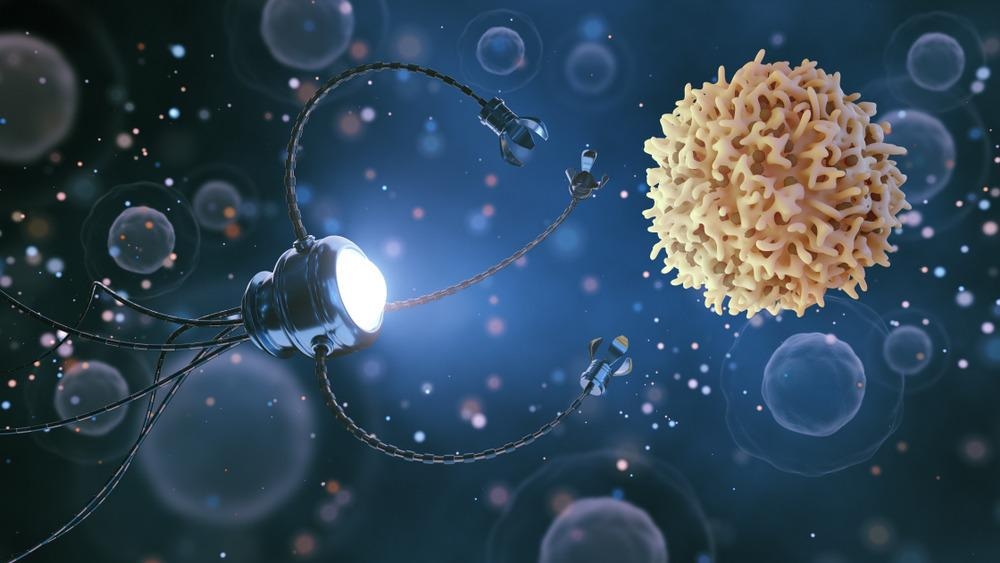Nanotechnology has found application in a multitude of sectors and industries, providing solutions to several critical challenges of the 21st century. This article will look at one of the fields made possible by this technology, molecular nanotechnology.

Image Credit: K_E_N/Shutterstock.com
The principle of molecular nanotechnology is based upon Richard Feynman’s vision of nanoscale factories using complex machines to build products. It deals with engineering nanoscale machines that operate on the molecular scale distinct from other areas of nanotechnology, such as nanoscale materials.
Machines are built according to the principle of mechanosynthesis to precise, complex atomic specifications. Diamond mechanosynthesis, for example, has received much research attention over the past 10-15 years.
Molecular nanotechnology combines principles in many fields such as biophysics and chemistry, drawing from the molecular machinery of biological organisms and systems engineering principles that guide the development of modern macroscale factories. One specific technology that the field is associated with is the molecular assembler, a device that can construct nanoscale machines atom-by-atom.
Potential Applications of Molecular Nanotechnology
Molecular nanotechnology has the potential to be applied to many sectors, helping to provide solutions to critical problems and give researchers new, innovative tools that will drive fields of science forward into the future. For instance, nanoscale machines constructed by mechanosynthesis can be used as smart materials, nanosensors, self-replicating nanobots, medical nanobots, and phased-array optics.
Smart materials could be designed that mimic human skin as they would be self-repairing, vastly reducing maintenance costs and safety issues, while intelligent sensors could change their behavior by reacting to the environment.
Nanomedicine is one of the most exciting potentials of molecular nanotechnology. Large numbers of medical nanobots could be employed to rapidly eliminate disease and provide ultra-targeted pain relief for patients. They may also be able to correct hereditary conditions and even extent lifespans. However, ethical concerns have been raised over this application of nanotechnology.
Industrial Impact
Manufacturing will be less constrained by capacity: the microscopic size of nanomachines and materials will allow greater volumes of product to be produced at a vastly reduced cost. Furthermore, the construction of stronger and much lighter materials that are an improvement to relied upon steel and aluminum is a potential application. Complex, next-generation molecular computers will be possible, significantly improving on computing power.
There is a potential economic benefit, as well. Molecular nanotechnology will almost eliminate the scarcity of manufactured goods and make much more possible, positively impacting the economic health of both developing and developed nations.
Risks of Molecular Nanotechnology
Molecular nanotechnology, and the wider field of nanotechnology, presents several risks.
The development of new biological weapons is one danger associated with the field; devices may have the ability to replicate in the human body like viruses and bacteria. The future impact of utilizing this technology has been discussed to great length, generating a wariness around the implementation of molecular technology.
As such, the Foresight Institute has prepared guidelines for the ethical development of nanotechnology. Designing a set of strict regulations for molecular nanotechnology research and development is vitally important as this field develops, aiding risk prevention and increasing confidence in the benefits of this technology.
Future Outlooks
The nanotechnology market is predicted to grow to $33.63 billion by 2030, and in 2020 was valued at $1.7 billlion. As advances are made in molecular nanotechnology, the sector is likely to make up an increasing share of this projected growth. In a rapidly changing world facing issues such as pandemics, climate change, population growth, and the new space race, molecular nanotechnology may play a key role in human development.
Realizing technological innovations and bringing them into the mainstream requires significant multidisciplinary advances; however, the ability to produce successful, effective biomedical and manufacturing solutions is an exciting opportunity. Molecular nanotechnology is a field that is truly at the leading edge of scientific research in the 21st century.
Continue reading: How has Nanotechnology Developed Over Time?
References and Further Reading
Scitechnol.com. (2021) Molecular Nanotechnology | SciTechnol | Journal of Nanomaterials. [online] Available at: https://www.scitechnol.com/nanomaterials/molecular-nanotechnology.php
Foresight Institute. (2021) Foresight Institute - Catalyzing Transformative Technologies. [online] Available at: https://foresight.org/
Tewari, D., (2021) Nanotechnology Market Outlook – 2030. SE : Emerging and Next Generation Technologies. [online] alliedmarketresearch.com. Available at: https://www.alliedmarketresearch.com/nanotechnology-market
Disclaimer: The views expressed here are those of the author expressed in their private capacity and do not necessarily represent the views of AZoM.com Limited T/A AZoNetwork the owner and operator of this website. This disclaimer forms part of the Terms and conditions of use of this website.